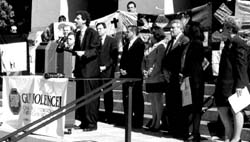| SACRAMENTO
continued... Instead of speaking up himself, Malte watches Blek and others who are testifying in support of Assembly Bill 488 introduced by Assemblyman Louis Caldera, (D-Los Angeles), which would ban the manufacture and sale of such cheap handguns, frequently called “Junk guns.” Blek tells the story of her son's death and speaks passionately against the cheaply made guns and their potential to promote violence. She is cut off by the committee chair when her time is up and the floor is given to the opposition. National Rifle Association representatives testify that banning such guns would discriminate against the economically disadvantaged who can't afford better made guns. A hiss comes from somewhere in the audience. The committee breaks for lunch at 12:30. Malte, Blek and other activists gather in a crowded cafeteria to eat sandwiches, network and pat each other on the back. “I feel pretty good about what happened today,” Malte says. “It's all a process of education and slow progress.” Of the bills Malte had his eye on this morning, all four passed the first hurdle — they were approved by committee. This achievement represents a sharp change from last year when a series of gun-control bills died in the same committee. This year, with the public safety committee controlled by Democrats and a majority of Democrats in the assembly, gun control legislation is having an easier time getting off the ground. Backed by democrats like Caldera, Wally Knox (D-Los Angeles), Antonia Villagraigosa (D-Los Angeles) and Jack Scott (D-Altadena), the handgun control bills are coming in response to grass roots organizations like the Bleks'. It represents the same movement that got ordinances to ban the sale of cheap handguns passed in cities up and down the state — including Los Angeles and San Francisco. The next step is for the bills to go to the Assembly's Appropriations Committee to review their fiscal impact. While he's glad the chair of the committee, Carole Migden (D-San Francisco) is sympathetic to the handgun control cause, Malte's lobbying efforts with the Appropriations Committee members will have to start right away. And when the bills reach the assembly floor, Malte will have to further widen his efforts to target all of the possible swing voters, most of whom are rural Democrats whose constituencies are more likely to include gun-users. “The Assembly is where it's tight, in the Senate, we have the votes,” he said. “We have to have 41 votes to get the bill to the governors desk.” The fate of the bills in the hands of Republican Governor Pete Wilson is unknown, but, after last year when the few gun control bills that were introduced were easily defeated, Malte said just getting the bills to the assembly floor will be a victory. Malte attributes the current success of gun control legislation to tireless efforts to educate the public around such issues as the assault weapons. One of the legislators who helped spearhead the ban in the Senate is California's Dianne Feinstein. If Feinstein's rumored run for governor is successful, future gun control measures may have even further success. “It's a great time to be in the movement,” Malte said. “I'm benefiting from all of the people that worked so hard before me.” Michelle Scully was one of them. After she was wounded and her husband, Jon, was killed in the 1993 shooting massacre that took place in San Francisco's 101 California office building, Scully became an activist for handgun control. While she may not know it, she also spurred Malte into action. Having gone to college in San Francisco with the Scullys, John's death hit close to home. Malte started volunteering with Handgun Control, Inc. and eventually quit his job to become a full-time staffer. “I found I was more passionate about what I was doing as a volunteer than what I was doing for a living,” he said. While Malte will continue to spend time in Sacramento on behalf of Gun Control, Inc, Mary Leigh Blek has returned to Orange County where she meets constantly with citizens to help raise their awareness of gun control issues. Blek said her biggest enemy is apathy. “There's a denial mechanism that we use very readily down here,” she said. “We need to be part of the solution not put heads in the sand.” But just the fact that the issue is being discussed more often, makes her feel that progress is being made. |
Gun control activists rally at the state capitol. |
